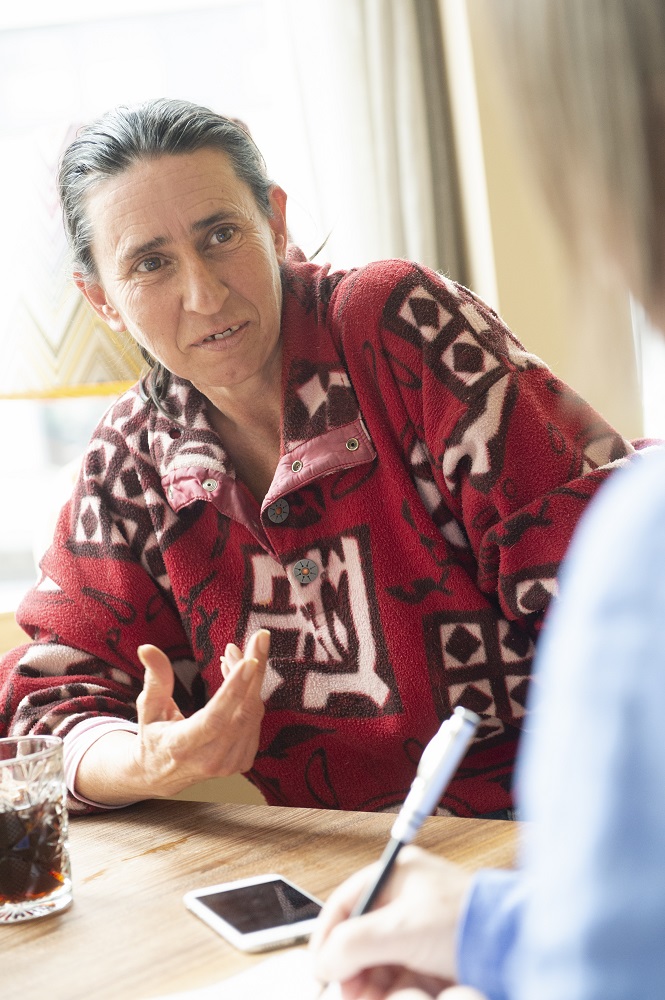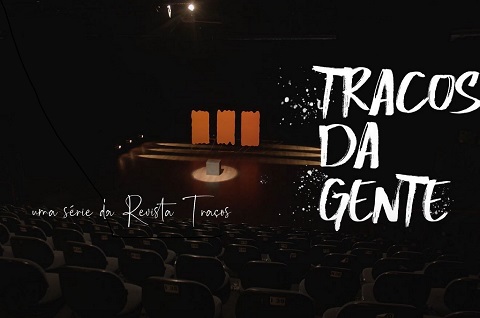By Christina Repolust, Apropos
It’s not that easy to keep up with Sonja Stockhammer. She walks quickly and steers me purposefully through the hotel to its café, where we sit down to chat. “You can ask me anything you want, but I’ll tell you if the question is too private or not,” she tells me, before we begin. That’s how Sonja starts the conversation: delicately treading between the lines of distance and closeness and trust and retreat. “Look, our photographer just passed us!” she calls out. And she is right. Andi Hauch walks through the door a little later, muttering “I’ve just missed the entrance.” Sonja nods, satisfied: “Sure, I was right, I know what I see. Do not underestimate me!”
Sonja starts by telling me about her horses, dogs and cats. She knows that up until now she has always been able to rely on her animals. “I have never been disappointed by an animal,” she confides. During our conversation, Sonja decides what she wants to talk about and what she does not. “I have been through a lot and some things have been really hard,” she says. “But let’s leave that aside and talk about something else.”
For twenty years, this slender, athletic woman has been selling the Apropos. She has also been involved in numerous book projects and was generally nervous before most of the readings that she has taken part in. “That said,” she smiles, “they always went well.” Every time Sonja attends writing workshops, she impresses me with the speed at which she produces her writing. “What is the topic?” she’ll ask me. This is shortly followed by, “Aha, then I write it in that way? Don’t I?” The concept of writer’s block seems alien to her. Sonja walks, talks, writes and thinks fast – very fast. When I say this to her, her response is, “Well, what should I be waiting for?”
On Thursday, Sonja sells copies of the paper at the Schranne [Salzburg’s weekly market] from her pitch on Mirabellplatz. Her regular customers are always coming to see her. “Of course, we have many conversations with each other,” Sonja says, “My people already know me well: they know when I want to talk or when it’s better to leave me alone.” During these moments, she stays friendly, but she does not feel like chatting: “One does not have to talk all the time: sometimes it’s just better to shut up.”
“I have been through a lot and some things have been really hard.”
After finishing school, Sonja started working in the hospitality industry. “I didn’t care what kind of work I was doing,” she says, “although they really made us work hard at the time.” When Sonja talks about this stage of her life, she speaks even faster than normal: “During those times, we never dared to just look up or work slowly.” Say what there is to say and then keep silent: that’s how Sonja set the rules for our meeting. Sitting next to her, it’s easy to be silent: she’s sipping her coke, I’m sipping my tea and we are both thinking about what we’ve just been talking about. “Sure, you can write that I live in the countryside,” she says, breaking the silence, “but where exactly, that’s nobody’s business. It’s quiet there: I go outside, and I find myself in the middle of nature.”
I continue our conversation by asking Sonja about how she named her first horse. “Nabucco was my first horse: a warmblood,” she recalls. “Even as a child, I’d spend every day on a horse ranch, where I helped out and also rode.” Before I can even start imagining little Sonja on a good-natured pony riding through the fields between Salzburg and Upper Austria, she interrupts my thoughts and grins. “Come on! A pony? No way!” she laughs. “I rode on a real horse, that always worked out. I know how to deal with horses. Of course, I sometimes fell off, but that’s part of it.” And so my pony-Sonja fantasy ends abruptly. Sonja is right, she would probably never have fit on a pony. By that I mean that she has always demanded a lot from herself. I can imagine her up on the big horse: a young, slim girl trying to fit into the tough working world.

There are conversations where all of what has been said nicely lends itself to a rounded story. But with Sonja it doesn’t work like that. I listen to her words – the brief sentences and all the hints – and start to realise that there are many unspoken truths in between the words that she is telling me. “I always try to look ahead,” she says. “A little something is always possible. It’s the same with selling the street paper, and it’s like that everywhere in life.”
Freedom is important to Sonja: she both gives it to others and seeks it for herself. “When I am inside, I sometimes feel locked up,” she admits. “As soon as I go out, I immediately have the feeling I can breathe again: nature is my breathing space. I’ve never been a couch potato – only when my foot was healing from an injury – but I worked on getting back to going for longer walks. Whining never helped me.”
“When I am inside, I sometimes feel locked up. As soon as I go out, I immediately have the feeling I can breathe again: nature is my breathing space.”
Looking at Sonja, I wonder what would happen if I gave her a hug. “Why are you grinning like that?” she asks me, warily. Sonja is an attentive observer, but, at the same time, she doesn’t bother probing for too long. I swiftly move on and say, “Nothing, I was just thinking of something.” When I move on to talk about reliability and loyalty, Sonja becomes serious. “In my life, my animals have never disappointed me,” she says. “Animals are honest – more honest than some people who pretend to be someone else. I’ve spent a lot of time understanding the language of animals, which is really a language on its own. With words you can offend, mislead and even lie to others. The animals and I speak a completely different, common language.”
I tell Sonja that the image of wild Sonja on her wild Nabucco is a picture that I can vividly imagine in my mind. “When I got on it, the horse knew immediately how I felt and vice versa,” she recalls. “You do not need a lot of words: it’s about feelings and trusting each other.” And, with that, Sonja has said everything that she wanted to reveal about herself. “Make a good story out of it. I have told everything there is to tell,” she says. “Now I have to go and get the train. I want to go home and then maybe go for a little walk.” After she leaves, I think about the fact that it’s not the big, polished words that give meaning and depth to a conversation; rather, it’s the little hints, nudges and smiles that go along with them. I smiles when I think about the fact that Sonja has told us so much about herself and her feelings about freedom, trust, and about taming and being tamed – often without using any words at all.
Translated from German by Eva Schueckel




















